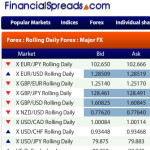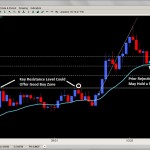What is Spot Trading?
Did you know that when you are trading Forex through an online broker, you are actually trading through the spot market? Most people don’t give much thought to the nuances of the Forex market, which in a global sense includes all spot, futures and swap trades. If you’ve ever gone to the money changer or the bank to exchange one currency for another, you’ve participated in a spot trade. That’s the essence of trading currency “on the spot”. The interbank market is simply a more sophisticated and more liquid arena for these trades to happen.
Trading spot has many advantages over trading futures (and I won’t even get into swaps because these aren’t of great interest to your normal retail trader). For one, the spot market is where the lion’s share of the liquidity is when it comes to buying and selling any kind of currency. Another thing that makes trading on the spot market attractive is that it’s not limited by the trading hours of any particular futures exchange. All in all, there’s a reason why the majority of traders in your shoes have been and will continue to trade in the spot market, and I will expand on it in this article.
How Spot Trading Works
By definition, a spot Forex transaction or trade is an agreement by two parties to buy one currency and sell another currency at an agreed price for settlement on the spot date. These transactions are done “over the counter” in what is loosely referred to as the interbank market, which is essentially a network of banks, brokers and institutional investors all around the world. In the spot market, there is no central exchange, and therefore no uniform price. However, arbitrageurs and the competitive nature of the market ensures that the currency prices are more or less the same at any given time.
The biggest difference between spot FX and currency futures is the settlement date. Generally, spot trades are settled within 2 days of the transaction. The exception is the USD/CAD, which is settled within a day. This is called the spot date, and this is the date when the delivery of the currency is made. Obviously, very few retail traders would want to take delivery of the underlying physical currency, so what they do is “rollover” into a new position if they want to hold it for longer than the 2 day period, or close it out and take whatever profits or losses they have on the position.
The Advantages Of Spot Trading
The first obvious advantage of spot trading is that you can find a counter party to your trade at any time throughout the day, every day from Monday to Friday. There are no exchange hours, and therefore no overnight risk (although there IS that risk if you carry your position through the weekend).
Another major advantage of trading spot FX is the massive liquidity available to you compared to the futures market. The spot market is the first place that every major institution and trader will go to do their trades, which means that you can expect better spreads and the ability to take larger positions without worrying about slippage. Instead of paying the commission to the exchange for each round turn lot, you pay a slightly increased spread to your broker.
Finally, and most importantly to the retail trader, you can buy smaller lots than the standard 100,000 unit lot in the spot market. If you were trading futures, your minimum trading size would be 1 lot of the standard contract size. Being able to trade smaller lots means that more people can enter the market with less capital, and they don’t have to over leverage themselves when they are first starting out.
Related Posts
Have you Tried Binary Options Trading Yet?
 Binary Options trading is one of the newest forms of trading to hit the markets. Binary options allows you to trade currencies, stocks or indices with fixed odds. For more information visit our recommended broker now:
Binary Options trading is one of the newest forms of trading to hit the markets. Binary options allows you to trade currencies, stocks or indices with fixed odds. For more information visit our recommended broker now:











